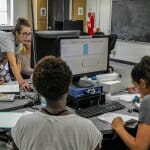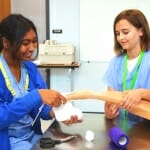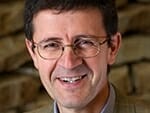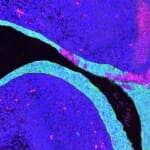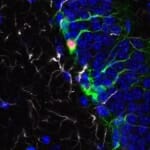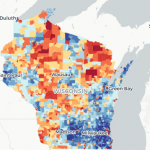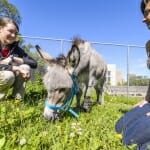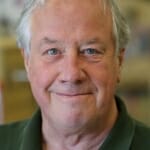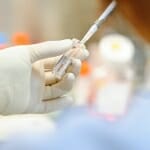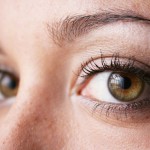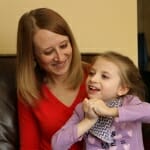Tag Health & medicine
Students prepare for healthcare careers in UW summer physiology course
In Physiology 335, students capture and analyze data from their own bodies using computer software and electrode wires. Sinclair Richards For…
Local high school students participate in UW–Madison paid internship program
Seven high school students are working in UW–Madison's Small Animal Hospital as part of a new program that exposes high schoolers to careers and curriculum in the health sciences.
Scientists discover cause of aging-related disease in mice, then reverse its symptoms
UW–Madison researchers have shown that mice making too much of a human protein called AT-1 show signs of early aging and premature death, which are also symptoms of the human disorder progeria.
The bladder can regenerate like nobody’s business and now we know why
New research from the UW–Madison School of Veterinary Medicine shows that non-bladder cells from a nearby anatomical structure called the Wolffian duct can actually help the bladder mend itself.
Study points researchers toward new therapies for fragile X syndrome
A UW–Madison study showed that the absence of the protein FMRP can unbalance critical molecular processes within adult brain cells and lead to the neural and cognitive changes seen in fragile X.
Map helps guide public health decision-making
“We want this to be a tool that everyone can use,” said Amy Kind, an associate professor of medicine. “We hope this will be a catalyst to ... eliminate U.S. health disparities.”
UW announces community partnership awards
UW-Madison is honoring seven collaborations with the 2018 Community-University Partnership Awards, ranging from an effort to increase food composting to leadership training for women in government.
Ferguson back on his feet with UW’s help
Ferguson the miniature donkey is walking again after a veterinarian at the School of Veterinary Medicine amputated his deformed hoof, and a prosthetist fitted him with an artificial limb.
Groundbreaking hearing researcher shares $1 million prize
Robert Fettiplace, who pioneered techniques to better understand the physiology of hearing, is one of the winners of the Kavli Prize in Neuroscience, for work that helped unravel the mysteries hearing and deafness.
Fast start, great mentors, natural aptitude and total passion: ingredients of a legendary career in nursing research
A faculty member for UW–Madison's School of Nursing for more than half a century, Karen Pridham has made her mark with her work on caring for severely ill children, many of them born highly prematurely, and their families.
UW-Madison biomanufacturer offers essential gene-transfer capacity
A UW–Madison lab that makes proteins, antibodies and viruses has begun manufacturing a virus critical to experimental treatments for many genetic conditions.
New imager identifies tissue types during surgery
UW-Madison spinoff company OnLume is continuing to develop its system for identifying tissue types during surgery. The company’s technology causes chemical labels to glow in the operating room.
Stem cell symposium to highlight clinical trials, safety and regulation
Speakers at the annual Wisconsin Stem Cell Symposium will discuss clinical trials involving stem cells, safety considerations and the regulatory environment under which ongoing stem cell work takes place.
Fueled by tragedy, Cardiac on Campus helps students take care of hearts
The organization hosts fundraising events to install AEDs, teaches students and community members CPR for free, and raises awareness about heart disease, the number one killer in the U.S.
Use of mobile app reduced alcohol and drug use
The application called Seva provides a discussion board, interactive modules to teach problem solving, tools for coping with cravings and high-risk situations, and other features.
As influenza looms, Madison firm advances human trials of revolutionary vaccine
One of the most promising universal flu vaccines is being developed by FluGen, a spinoff from the University of Wisconsin–Madison. Next up is an experimental trial.
Study advances gene therapy for glaucoma
A new study shows an improved tactic for delivering new genes into the eye's drain, called the trabecular meshwork, offering a promising treatment for glaucoma.
Waisman research into rare syndrome offers hope for families
Waisman Center research into the molecular mysteries of Rett Syndrome may ultimately help an 8-year-old girl who suffers from the rare neurological disorder.
Lake Michigan waterfowl botulism deaths linked to warm waters, algae
UW-Madison researchers, with the help of citizen scientists, tracked bird deaths along Lake Michigan, and found that warm waters and algae apparently promoted the growth of botulism toxin-producing bacteria that caused them.

